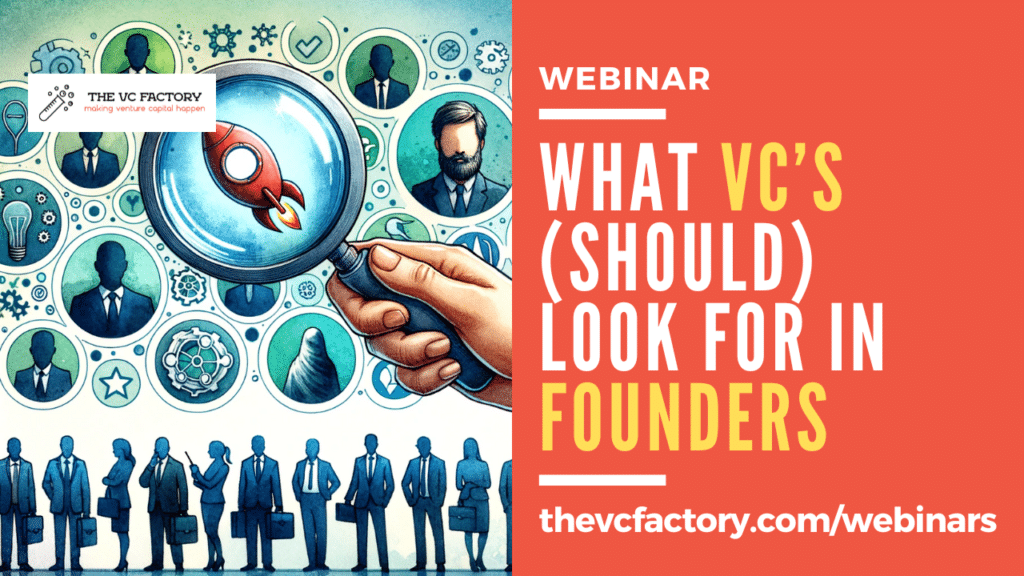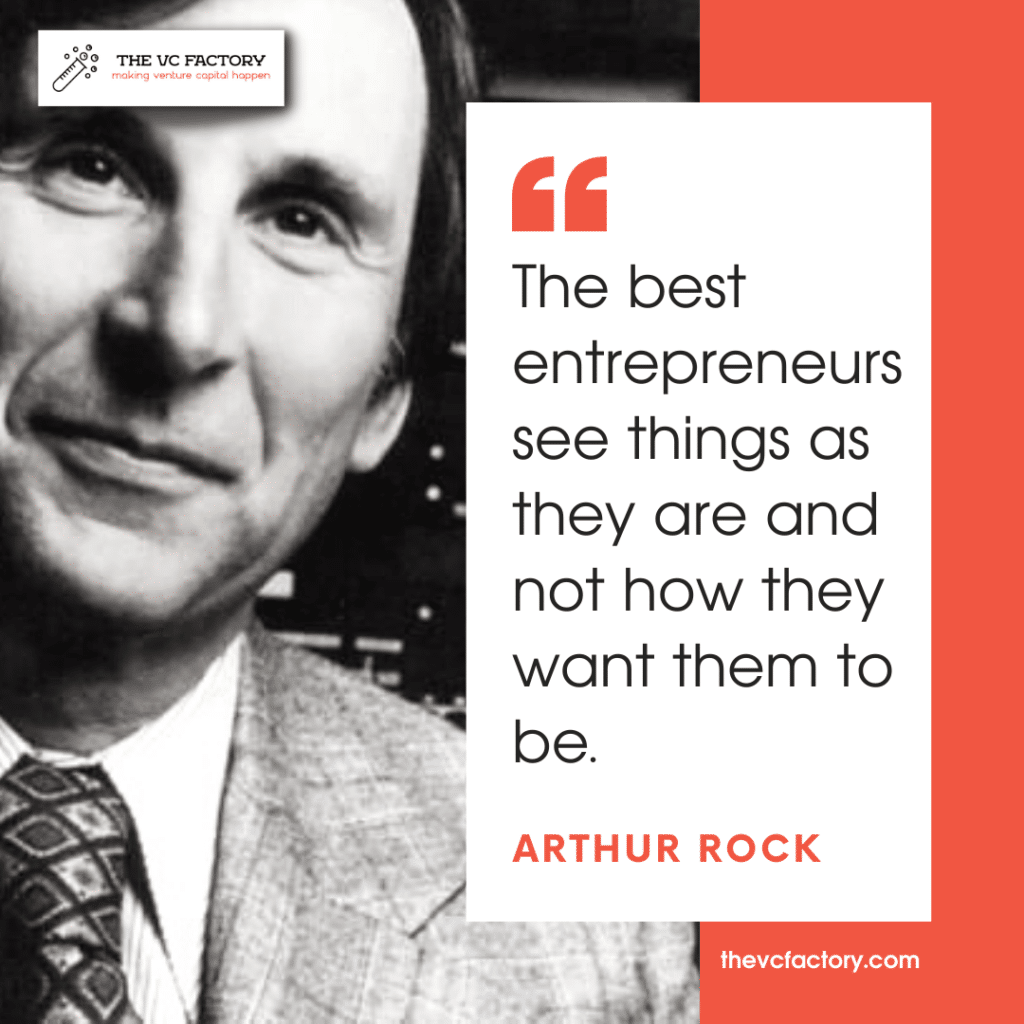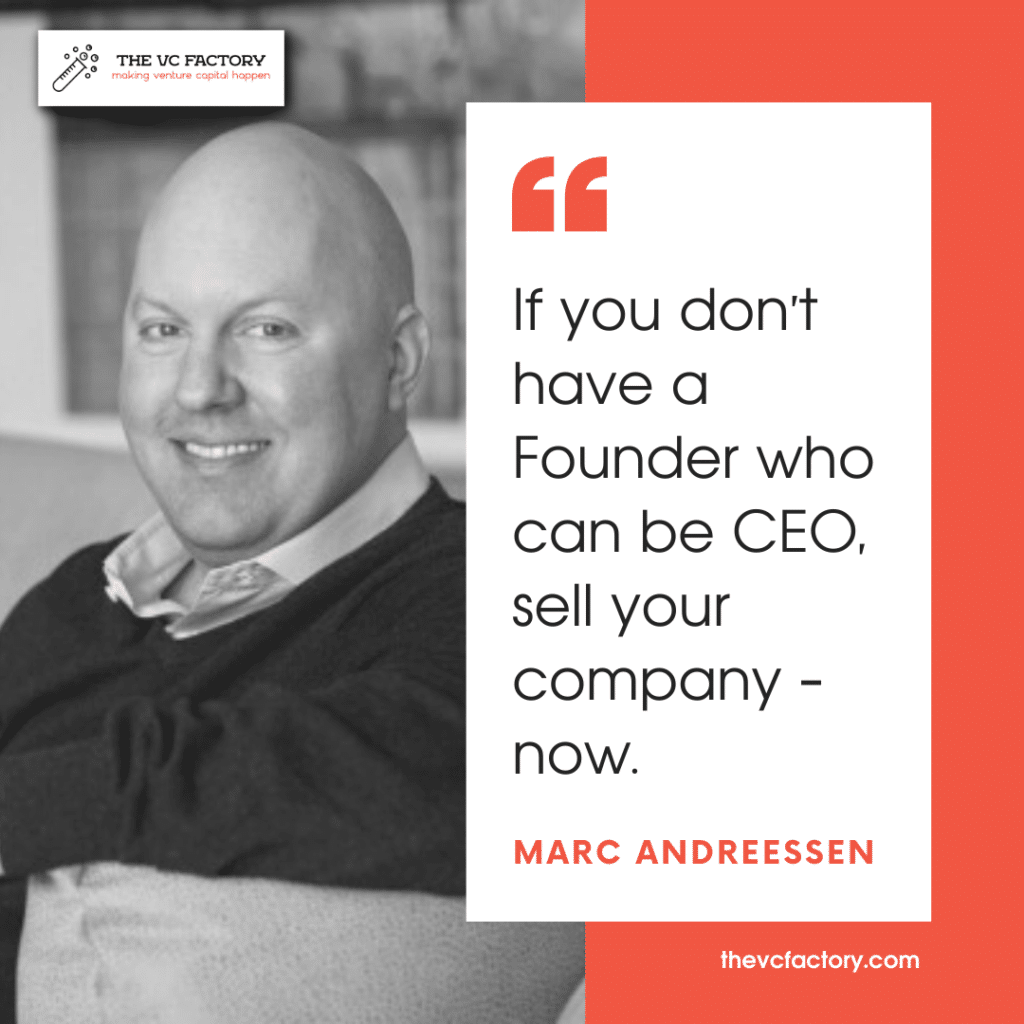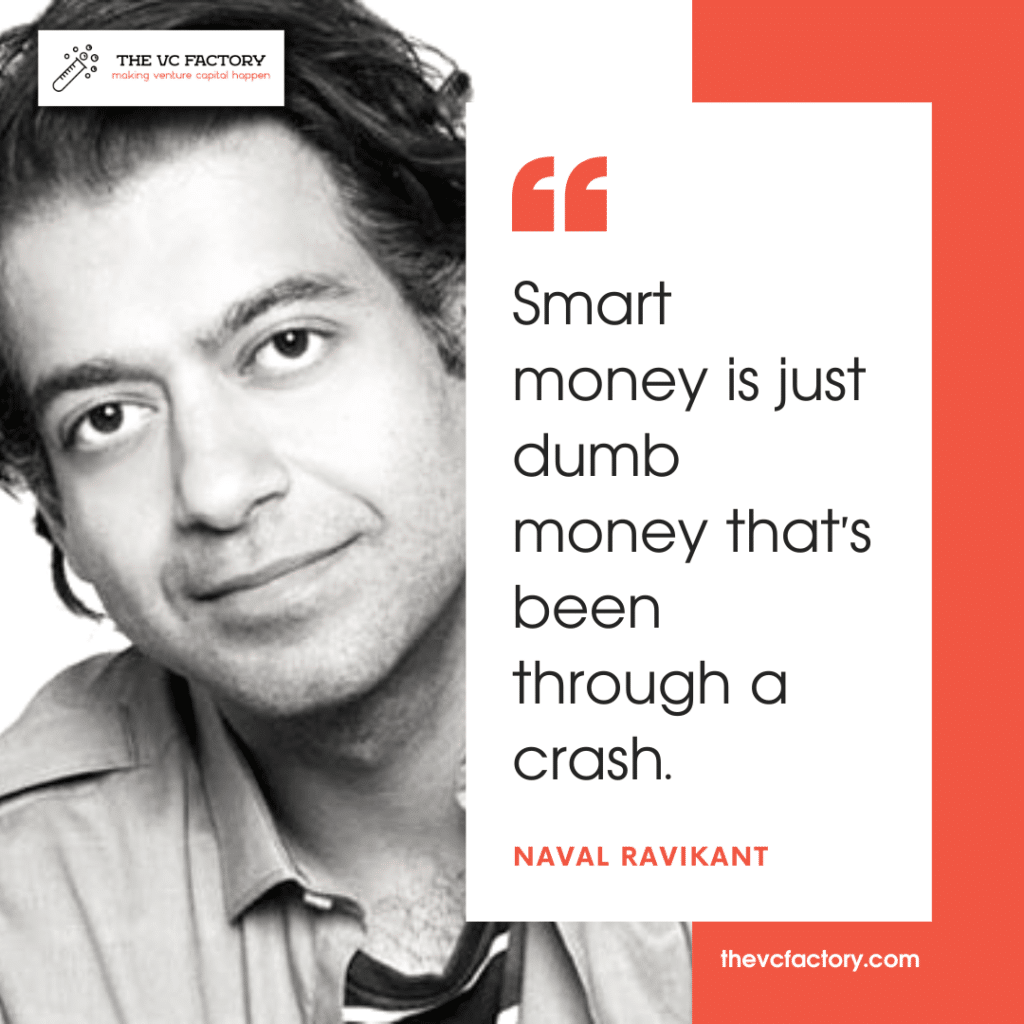How Venture Capitalists Evaluate Successful Startup Founders

Venture Capitalists always stress that their most important investment criterion is the quality of the startup’s Founding team. What are the characteristics and personality traits Investors are looking for? More significantly, what are those they should be looking for but routinely don’t—often due to unconscious biases? Since betting on successful startup Founders is a large part of their performance, one may wonder why Venture Capitalists don’t pay more attention to mental drivers.
In This Post
Accelerate Your Learning: Watch Our Webinar!
Don’t just read about it, immerse yourself in the content through our companion webinar for this post! Engage with a multimedia presentation, discover all the referenced sources, and have your questions answered live! Click the “Watch Now” button to access the webinar. (Members: click here).

The Most Important VC Investment Criteria
When asked about their most significant investment criterion, VCs answer, “The team.” Recent data collected by top academic researchers in Venture Capital confirmed anecdotal evidence. According to a survey of 885 institutional Venture Capitalists from 681 distinct firms published in 2020, the team was mentioned as an essential investment factor by 95% of respondents.
When asked about the most significant factor in their investment decisions, nearly half of VCs identified the team, significantly outweighing other parameters:
- Team: 47%
- Fit with the investment strategy: 14%
- Product: 13%
- Business model: 10%
- Market: 8%
- Industry: 6%
- Ability to add value: 2%
- Valuation: 1%
This emphasis on the team underscores the VC’s belief in backing the “jockey” over the “horse,” highlighting the predominant conviction that the right group of individuals is crucial to navigating the startup from potential to success.
The Qualities of Successful Startup Founders
Venture capitalists often tout the founding team’s significance to startup success. Yet, they seldom articulate the specific traits they deem essential, leading to a lack of consensus within the industry.
Fortunately, the comprehensive study by Gompers et al. (2020) offers much-needed clarity on this subject, providing solid data on the qualities that VCs look for.
When assessing the management teams of potential startup investments, Venture capitalists prioritize the following qualities:
- Ability: This is the most cited attribute, with 67% of VCs emphasizing its importance. A Founder’s ability is a comprehensive measure of their skills, decision-making, and overall capacity to execute their vision.
- Industry Experience: Valued by 60% of VCs, this quality speaks to a Founder’s deep understanding of the sector they are operating in, which can be pivotal for identifying market gaps and competitive advantages.
- Passion: Highlighted by 54% of VCs, passion is considered a driving force behind a Founder’s motivation and commitment, which is often reflected in their work ethic and product development.
- Teamwork: Acknowledged by 50% of VCs, the capacity to work cohesively within a team is essential for driving a startup’s growth and fostering a collaborative company culture.
- Entrepreneurial Experience: 50% of VCs regard prior startup experience as critical, as it often equates to resilience and a proven track record in navigating the complex landscape of new business ventures.
I provide context and real-life examples of each criterion in the following sections. Watch the webinar for more explanations.
#1 – Ability
The study by Gompers et al. (2020) does not define “ability,” so we can surmise that VCs mean different things here. Garry Tan, a former VC turned Y Combinator president, detailed six skills that successful startup Founders must possess:
- Engineering: Understanding technology provides significant leverage. Founders need not have a computer science degree but being technically proficient or at least understanding the technical aspects is critical.
- Product: Product skills entail knowing what to build and for whom. It’s about running the product function effectively, understanding the market needs, and refining the product-market fit continuously.
- Design: Garry Tan divides design into two parts: interaction design (user experience) and visual design (user interface). Founders should have a good sense of design or, at the very least, appreciate sound design principles.
- Sales & Marketing: The ability to sell and market the product is undervalued but vital. Founders need to be able to get their product in front of people and convince them of its value.
- Finance: Financial literacy becomes crucial as the startup grows. Understanding corporate finance principles can help Founders make informed decisions and understand their business’s value from a financial perspective.
- Management and Leadership: Effective leadership and people management skills are essential. Founders need to inspire, lead by example, and manage a team towards achieving shared goals.
It’s rare for one person to possess all these skills, which explains why VCs favor Founding teams over solo Founders.
Another helpful framework is the “Founder-CEO” concept popularized by Andreessen Horowitz. The idea is that it’s easier to train Founders to maximize product cycles than to train professional CEOs to find product cycles. Read the article below for more details.
#2 – Industry Experience
The second spot on the list of characteristics Founders must possess often surprises outsiders, who believe former entrepreneurial experience would be more significant. Venture Capitalists highly value prior industry experience in Founders they choose to back for several reasons.
Industry experience equips Founders with a deep understanding of market needs, customer pain points, and the competitive landscape, enabling them to better navigate complexities and opportunities.
The “I had that problem for 15 years as an employee, so I decided to do something about it” story is music to a VC’s ears. Since the first cause of startup death is making a product that nobody wants, having insight into a real paint point is highly valued.
More experienced Founders are also more likely to have relevant networks, including potential customers, partners, and talents, which can accelerate the startup’s growth and development. They also have more capital, allowing them to bootstrap longer before raising funds.
Firsthand experience means these Founders have likely encountered and overcome industry-specific challenges, showcasing their problem-solving capabilities and resilience. This prior exposure reduces the perceived risk from the VC’s perspective, as it suggests the Founder has a more realistic grasp of what it takes to succeed, increasing confidence in the startup’s potential.
An average unicorn founder started their first unicorn at the age of 35.
ILYA Strebulaev – Stanford (Source: LinkedIn)
Data from Ilya Strebulaev’s research at Stanford University reveals insightful patterns about Unicorn Founders. It highlights that the median age for founding a unicorn company is 33, with an average age of 35, indicating that maturity and experience play a significant role in building high-value companies. The mean age of Founders at the founding of all VC-backed firms is higher (42), with the high mean for Founders of successful exit startups (46 at company inception).
#3 – Passion
Passion is often heralded as a cornerstone of entrepreneurship. It fuels the relentless and tumultuous pursuit of an entrepreneurial vision and can be infectious, inspiring others to believe in and support it.
Such fervent enthusiasm is critical because it sustains motivation over time, particularly through periods of uncertainty or adversity, which are common in the startup lifecycle. Passion energizes entrepreneurs, often leading to a deeper engagement with their work and a willingness to invest the significant time and effort required to grow their venture.
The Founders have to be completely and totally obsessed about the product. I don’t mean passion. Passion belongs in the bedroom.
Brad feld – Foundry Group (source: 20VC)
On the flip side, there’s an argument to be made for obsession being the more defining attribute of successful entrepreneurs. In entrepreneurship, obsession might manifest as a constant, unwavering focus on innovation and improvement. It’s an intense commitment that refuses to acknowledge the possibility of failure.
This is not without its dangers, however. A 2018 research article by Eva de Mol and colleagues indicates a darker side to an all-consuming entrepreneurial journey. When entrepreneurs are not a good fit for their job demands or lack the necessary resources, their devotion—no matter how intense—can lead to burnout.
This suggests that obsession, while potentially more potent than passion, requires careful management and an awareness of personal limits. Entrepreneurs must balance their relentless drive with strategies to maintain their mental health and well-being to avoid the detrimental effects of burnout. I offered remedies to this issue in the article below.
#4 – Teamwork
Teamwork is critical in building new ventures for a host of reasons, from complementary skills to multiplying workload, networks, and mutual support.
No single person embodies the entire spectrum of skills needed for a successful business. A diverse team brings a mix of talents and expertise, ensuring that all operational domains—be it technical, strategic, financial, or marketing—are competently managed. A strong team can also pool intellectual resources to devise creative solutions when encountering unexpected challenges and obstacles, often approaching problems from multiple angles that an individual might miss.
Team members hold each other accountable, ensuring tasks are completed efficiently and objectives are met. They possess a broader network, vital for securing funding, building partnerships, recruiting talent, and acquiring customers. They can also deliberate and discuss strategic decisions, reducing the cognitive biases an individual Founder may have.
The entrepreneurial path is fraught with setbacks and failures. A team shares the emotional burden of these lows, providing support and motivation to persevere when an individual might otherwise lose heart. The camaraderie can be a significant source of emotional support. Celebrating wins together can foster a positive and productive work environment.
It’s generally a bad idea to form a company with people you don’t know at all.
Peter Thiel – Founders’ Fund (Source: forbes)
During sessions of the VC Career Accelerator, I often comment to VCs who recently joined the industry that they need to learn two things: read teams and understand business models.
Experienced VCs are proficient at interpreting low signals from startup team members’ conversations during a pitch. Since many ventures fail because the co-Founders disagree on strategic matters, the quality of teamwork is a crucial criterion in the VC investment decision-making process.
Elite VCs like Peter Thiel ask co-Founders how they met. They value a history among them. For Thiel, the most reassuring narrative is one where co-Founders have engaged in extensive dialogue and contemplation about their business idea before deciding to embark on the entrepreneurial journey together. This history suggests a deeper level of commitment and a more thoughtful approach to starting a company, rather than a spontaneous decision fueled by the mere desire to be entrepreneurs.
#5 – Entrepreneurial Experience
Venture Capitalists often favor Founders with previous entrepreneurial experience due to the unique insights and resilience that such experience cultivates.
Founders with a history of entrepreneurship typically possess a refined understanding of the startup ecosystem, including how to navigate the complexities of product-market fit, customer acquisition, and scaling a business. They are more likely to have encountered and surmounted a variety of operational, strategic, and financial challenges, equipping them with the acumen to anticipate and mitigate potential risks in new ventures.
Seasoned Founders have established networks of potential customers, partners, and Investors, which can be leveraged to accelerate the growth of their new venture. Having previously managed a venture through its life cycle, they are presumed to have a more sophisticated grasp of the demands of leadership—qualities paramount to a startup’s success and thus attractive to VCs assessing the viability and potential return on investment.
Venture Capitalists also strongly prefer to invest in Founders they have previously backed, irrespective of the past venture’s outcome. This preference is largely due to the reduction in information asymmetry regarding the Founder’s capabilities. Through prior investment engagements, VCs gain a clear understanding of a Founder’s operational strengths, decision-making processes, and tenacity in the face of adversity.
They have a firsthand account of the Founder’s performance under pressure, commitment to the venture, and ability to pivot when necessary. Such intimate knowledge mitigates the risk often associated with the uncertainty of backing new, unproven entrepreneurs. This established rapport and track record provide VCs with a more predictable foundation upon which to base their investment decisions, making it an attractive proposition to reinvest in Founders with whom they have a history, successful or otherwise—even though, as I explain in the article above, Founders learn more from success than failure.
Other Traits of Successful Startup Founders
VCs cite many distinct qualities when asked what they look for in successful startup Founders. Over the years, I gathered specific examples, which I’m sharing here. Watch the webinar for real-life illustrations.
Vision: The Unique Insight
Venture Capitalists are particularly drawn to Founders who possess a unique insight into their industry—a profound understanding that others have not yet grasped.
VCs are in the business of identifying and investing in potential market disruptions, and a Founder’s unique insight is often the seed from which such disruptions grow. This unique perspective is a deep, often contrarian thinking that uncovers overlooked opportunities or hidden inefficiencies.
Have you thought for yourself? Is it something that you know that nobody else knows, or is it something that everybody knows?
Ben Horowitz – A16Z (Source: a16Z)
Such insights suggest that the Founder can see a clear path to creating value that no one else has capitalized on, whether through an innovative product, a novel business model, or an unexploited market niche. Founders with this vision can guide a company to market leadership and deliver outsized returns for Investors.
Let’s illustrate this point with two real-life examples.
Example 1: AirBnB
In a 2015 address at Columbia University, Ben Horowitz emphasizes the significance of independent thinking in entrepreneurship, using the story of Brian Chesky and Airbnb as a quintessential example.
He argues that the most important quality he looks for in entrepreneurs is not just a good idea, but a unique insight—a knowledge nobody else has. While a universally acknowledged good idea, like improving battery life in cell phones, might not pique his interest due to the competitive efforts of giants like Google, Apple, and Samsung, a novel and initially counterintuitive idea like Chesky’s Airbnb has a unique appeal.
Chesky’s insight was based on a real-world experiment. He realized that by leveraging the internet, he could bring the transparency and consistency of a hotel experience to the diverse and characterful world of inns and B&Bs.

Despite initial skepticism about the AirBnB idea (read the article above for more detail), Chesky’s unique perspective unearthed a forgotten truth about hospitality—that hotel chains standardized the uneven experience people had with inns and B&Bs, which were, to quote Forrest Gump, like a box of chocolates.
Thanks to forays in smartphones and apps (AirBnB launched after the iPhone), it was possible to standardize the bed and breakfast experience with photos and online comments. AirBnB could offer bed and breakfast’s personal touch with hotel chain reliability at a lower price point—a valuable competitive advantage given the challenging economy privileging home sharing in the wake of the 2008 Great Financial Crisis.
This case underscores Horowitz’s point that VCs are on the lookout for Founders who harbor insights that go against the grain. In this case, an overlooked historical precedent offered a fresh take on established industries.
Example 2: Snapchat
Lightspeed Venture’s investment in Snapchat is another example of VCs convinced by a Founder’s unique insight.
In a 2021 interview with Harry Stebbings on the 20VC podcast, Jeremy Liew explained that Evan Spiegel’s vision for Snap was the deciding factor in his investment decision, overcoming reluctance to back a student-led team, which was still relatively uncommon at the time—Spiegel was still at Stanford in 2012. While some successful social networks had emerged from Founders in their early 20s (Facebook comes to mind), the availability bias should not overshadow the rarity of such occurrences compared to the vast number of social networks launched in the 2000s.
Liew’s conviction in Snapchat was significantly influenced by Spiegel’s observation of the performance anxiety generated by traditional social media platforms like Facebook and Instagram, which often showcased only the highlights of users’ lives.
Spiegel identified that genuine relationships are built on sharing a full spectrum of experiences, not just the highlights. He noted the reluctance to share everyday moments due to the permanence of content on existing platforms.
What we look for in a consumer investment is: “Does the founder have a unique insight to explain the success, to explain what’s going on.”
Jeremy Liew – Lightspeed Ventures (source: 20Vc)
Spiegel proposed that Snapchat could encourage users to share more freely and authentically by making shared content ephemeral, fostering more profound and meaningful connections. This unique insight into human behavior and social interaction convinced Lightspeed of Snap’s potential to transform social media engagement.
While Snap’s tremendous growth and engagement rates were significant in Liew’s conviction process, the deciding factor was Spiegel’s ability to articulate the reason for such product-market fit.



